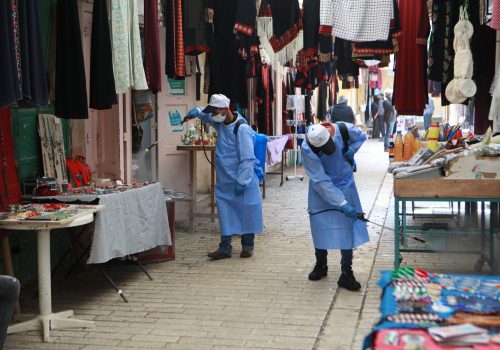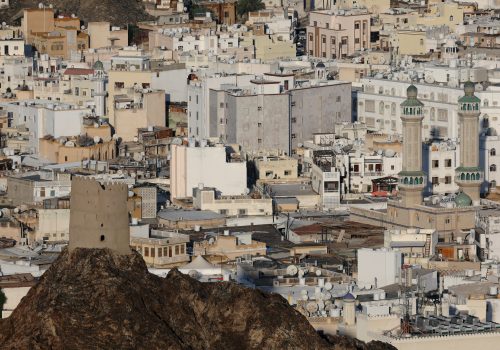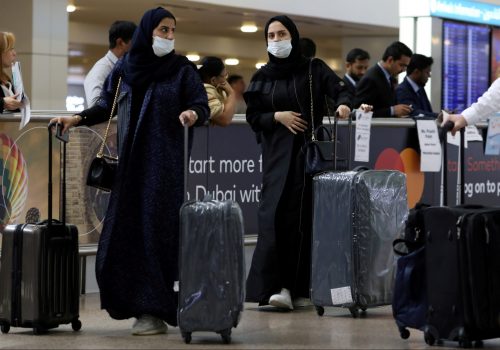China’s soft power during the coronavirus is winning over the Gulf states
As COVID-19 continues to batter the world, China has managed an impressive transition. A recent article in the New York Times notes that, through the short life of the coronavirus crisis, China has been able to reposition itself not as “the authoritarian incubator of a pandemic but as a responsible global leader at a moment of worldwide crisis.” The experience of the Gulf Cooperation Council (GCC) countries is telling. Early in the crisis, they were donors of aid to China—now, they are recipients. Through effective public communications, generous aid, and the sharing of expertise, China is furthering the impressive gains it has made in the Gulf in recent years.
The messages coming out of China’s embassies in GCC states have been effective, striking a confident and appreciative tone. Expressing thanks for the UAE’s support in the early days of the outbreak in Wuhan province, Lin Yaduo, the Chinese charge d’affaires at the embassy in Abu Dhabi, gave an interview in which he said, “When Burj Khalifa, Adnoc Headquarters, and other UAE iconic landmarks lit up the colors of the Chinese national flag and slogans of solidarity with China on February 2, many Chinese living and working here in the UAE were moved to tears.” In a bit of deft public diplomacy, Chen Weiqing, China’s ambassador to Saudi Arabia, tweeted that, while working from home, he was using his free time to catch up on Saudi literature, reading Hamid Al-Damanhouri’s 1959 novel, The Price of Sacrifice.
More targeted political messaging has focused on bilateral diplomatic cooperation. Each Gulf state—with the exception of Bahrain due to modest trade—has a partnership agreement with China. These agreements stop far short of alliance obligations but help build cooperative relations across economic and diplomatic realms. The utility of these partnerships is being emphasized by officials on both sides, perhaps, as a reminder that they are in this pandemic together. For example, China’s ambassador to Qatar, Zhou Jian, said, “China and Qatar are strategic partners who have joined hands in the face of adversity, and are supporting each other and fighting side by side the novel coronavirus disease outbreak.”
In a recent phone meeting between foreign ministers, Wang Yi of China and Abdullah bin Zayed of the UAE discussed ways to coordinate efforts in fighting COVID-19. Bin Zayed claimed that the “intensified channels of cooperation between the two countries on coronavirus” were strengthening the comprehensive strategic partnership signed in 2018.
Beyond rhetorical support, there has been tangible cooperation in the form of aid flowing in both directions. In the early days of the crisis in Wuhan, Gulf states stepped up to the plate. Qatar Airways sent five cargo freighters, each carrying three hundred tons of medical supplies—support that the Chinese ambassador publicly described as “unforgettable.” Kuwait delivered $3 million worth of medical supplies and Saudi’s King Salman Humanitarian Aid and Relief Center coordinated a large shipment of medical aid and supplies to Beijing in mid-February.
The UAE’s donations of medical supplies resulted in China’s foreign ministry spokesperson including it in a list of twenty-one countries that provided “friendly understanding, support, and help.” At the local level, the embassy in Abu Dhabi expressed gratitude, claiming that, “in the face of such adversity, the UAE people standing firmly with the Chinese people in solidarity and extending a helping hand is what makes our friendship ironclad.”
Now, that it appears that the worst is over in China, support is flowing in the other direction. This is an important development given that the GCC states are especially vulnerable to economic consequences from COVID-19. In terms of public health, they are still relatively safe, according to official numbers. As of April 15 there have been 121 reported deaths against approximately 17,000 cases. Early responses seem to have been effective, thus far, which is particularly important given neighboring Iran’s horrific coronavirus experience, with over 4,500 dead as of April 14.
However, their unusual demographic imbalance makes for a unique threat perception of the prospect of a rampant spread of the virus. Much of the private sector workforces in the GCC are expatriate and, if they don’t feel that their health or jobs will remain secure, many will likely want or need to go home. Dubai has already seen this, with 20,000 Pakistani expats registering with their consulate to be repatriated. If this were to happen on a large scale, Gulf economies would be devastated. With the twin shocks of COVID-19 and the collapse of oil prices happening simultaneously, an IMF report from earlier this year forecasting a possible depletion of the GCC’s sovereign wealth funds within 15 years is especially sobering.
Hence, Chinese assistance, both material and experiential, is not going unnoticed. In terms of material aid, the Chinese embassy in Muscat has recently donated a large supply of face masks to Oman’s health ministry. China’s embassy in Doha announced that it is providing four million medical masks and 640,000 disinfectants, while Chinese banks operating in Qatar donated one million pairs of medical gloves and seven thousand sets of protective gear. China’s ambassador to Kuwait announced that they could help in the construction of field hospitals dedicated to treating the coronavirus.
This is consistent with Chinese governmental and private outreach in states where they have significant economic and strategic interests. The Chinese government has sent thousands of test kits to the African Union, for example. This has been complemented by private donations from Jack Ma, China’s wealthiest man and former CEO of tech giant Alibaba, who has contributed 1.1 million testing kits, six million masks, and 60,000 sets of protective gear.
Beyond material aid, Chinese experts have been consulting with public health officials throughout the Gulf, sharing their knowledge of COVID-19 and their experiences in treating it. One such meeting was held on April 2, with officials from China’s National Health Commission, the Chinese Center for Disease Control and Prevention, and Peking University First Hospital’s infectious diseases department briefing Saudi Arabia’s health ministry. On the same day, a team from Zhejiang province held a Zoom meeting with officials from Abu Dhabi’s Burjeel Medical City to share their knowledge of isolation and containment, including the use of big data and information technology to track the spread of the virus. Later in the week, a larger meeting was hosted by the Arab League, with the Arab Health Ministers Council being briefed by Chinese coronavirus experts.
While China is facing backlash in the United States for its ham-fisted initial attempts to cover up the severity of the coronavirus, there has been no similar public blaming in the GCC. In fact, Beijing’s efforts are being lauded. The UAE’s foreign minister, Abdullah bin Zayed, recently cited China as “the best example for how these trying times will pass by through collaboration and solidarity between all leaders, governments and people of the world.” The immediacy of the crisis is the focus and aid and expertise are welcome. There are likely long-term considerations in play as well; in the aftermath of the COVID-19 outbreak, Gulf economies are going to be in serious need of friends with money, and China’s regional trade and investment footprint is deep. Long an economic power, Beijing’s response to the crisis is providing an opportunity to demonstrate its utility as a partner in other realms.
Jonathan Fulton is a nonresident senior fellow with the Atlantic Council. He is also an assistant professor of political science at Zayed University in Abu Dhabi. Follow him on Twitter: @jonathandfulton.
Image: Kuwaiti volunteers wear protective masks as they fill charity boxes with essential household supplies to distribute to the needy, following the outbreak of the coronavirus in Adeliah, Kuwait April 4, 2020 (Reuters)


